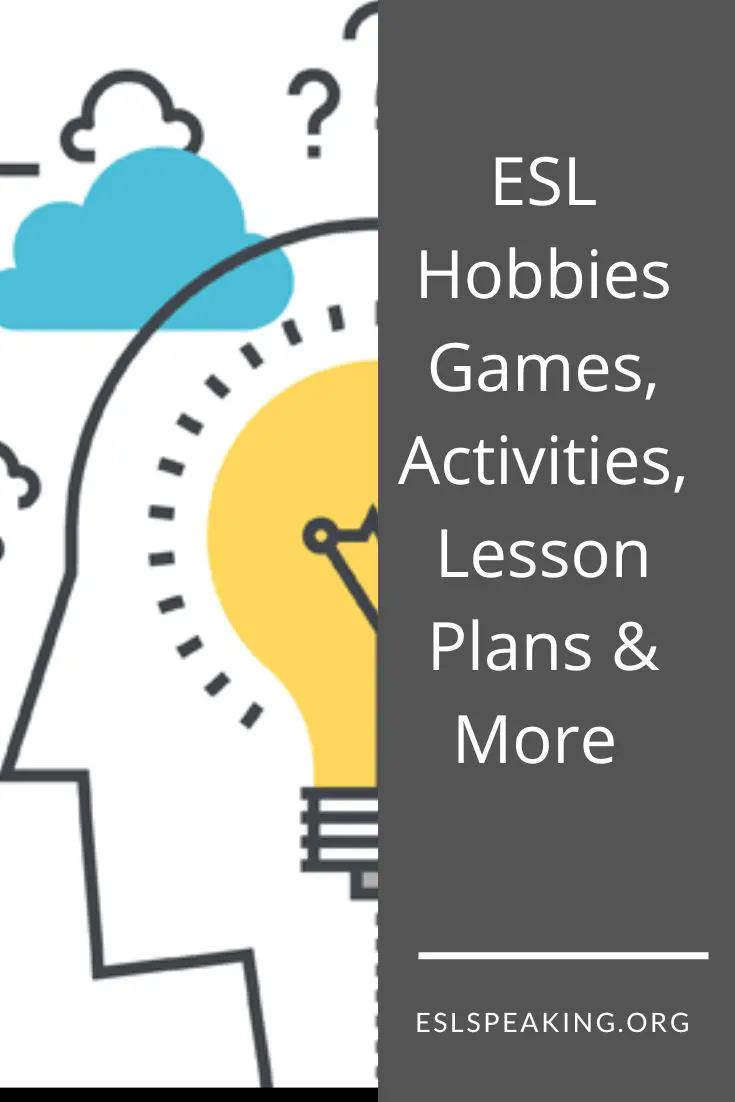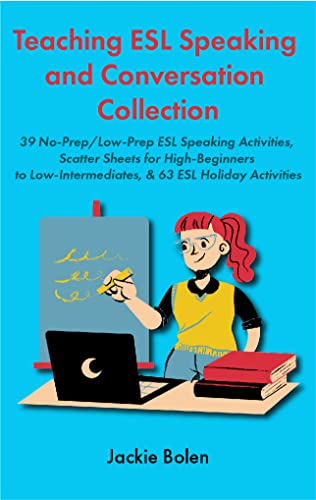If you’re looking for some of the best ESL hobbies games or free time activities, then you’re in the right place. Keep on reading for everything you need for ESL hobbies, including worksheets and lesson plans.

TEFL hobby games and activity ideas
ESL Hobbies Games & Free Time Activities
Let’s get into the best TEFL free time activities and games.
#1: Picture Prompt ESL Hobby Activity
This is a nice warm-up activity if you’re teaching about free time or hobbies. Put up a picture with people doing various hobbies, such as in a park.
Then, there are an array of options, depending on the level of the students. Have a look here for all the ideas:
#2: The Expert Speaking Activity
Try out this fun, interactive speaking activity with higher-level learners. The way it works is that students have to pick 3 things that they’re an expert in to have short conversations with other students about. It’s possible to restrict the options to hobbies or things that students do in their free time. Check it out:
The Expert ESL Speaking Activity.
#3: Flyswatter Game
Try out this flyswatter activity to help students review new vocabulary words.
#4: Just One Question ESL Hobby Activity
I love this survey-style activity! Students have to come up with an interesting question related to hobbies, survey a number of their classmates and then compile the results. After that, they can report back to the class about what they learned. Try it out:
#5: The Name Game
This is a nice way to review names and also find out the hobby of each of the students. It’s simple and works very well for beginners. Have a look:
#6: Running Dictation ESL Hobbies Game
Try out this fun activity that gets students out of their seats and moving around the classroom. Make (or find) a conversation between two people talking about their hobbies and you’ll be good to go. Find out the rest here:
TEFL Running Dictation Activity.
#7: Word Association
It’s likely that students already know a good number of hobbies and free time activities. If this is the case, try out Word Association for a quick warmer activity. It’ll help make new vocabulary words far more memorable.
#8: Sports Games and Activities
Sports are a very common hobby in any country! Here are some of the top ideas for this unit:
TEFL Sports Games and Activities.
#9: Hobbies Charades Game
A nice way to review hobbies is to have students play charades. They have to act out various hobbies and their teammates have to guess what it is. Check it out:
#10: Short Stories and Reading
- Amazon Kindle Edition
- Bolen, Jackie (Author)
- English (Publication Language)
- 138 Pages - 11/01/2021 (Publication Date)
Here’s one for your students who love to read as their hobby! Pick up a copy of this book about life in Canada. It’s written for English learners at an intermediate level. Check it out:
#11: Speaking Fluency Activity
I love to push my students to someone speak more quickly! It’s easy to focus on only accuracy but fluency is important too. That’s why I love to use this speaking fluency activity with my students.
#12: Conversation Starters
If you tell your students to talk with a partner about hobbies for 10 minutes, you may be met with silence! It’s better to give a bit more structure with some conversation starters.
That way, if students get stuck, they can refer to a starter and keep the conversation going. Find out more about this here:
#13: TV and Movie Activities
A common hobby is watching TV or movies. There are lots of fun activities you can do in class related to this. Have a look at some of my favourites here:
#14: I’m an Alien
This is a nice way to elicit a bunch of hobby-related vocabulary from your students. Check it out here:
#15: Dictogloss ESL Hobbies Activity
Dicto Gloss is a challenging listening activity for more advanced students. Write (or find) a passage where someone is talking about what they like to do in their free time.
Then, put students into pairs and read it out at a faster than usual pace. Students take notes and try to recreate what they just heard with their partners. Repeat the process. Then, the students compare what they have with the original.
#16: Hobby Matching Game
Create cards with pictures or names of hobbies. Students match the hobby to its description or a picture.
#17: A-Z Alphabet Game
It’s likely the case that your students already know lots of hobbies before you explicitly teach them. That’s what makes this A-Z warm-up game the perfect fit for this unit.
#18: Small Talk Activities
Small talk is often about hobbies and what people do in their free time. I love to give my students some practice with this in my classes. Have a look at some of the best ideas for that here:
#19: Restaurant and Ordering Food Activities
One of my personal favourite hobbies is going out to try new restaurants. It’s likely the same with many of your students. Check out some of the best ideas for this:
ESL Restaurant and Food Activities.
#20: Hobby Guessing Game
Describe a hobby without saying its name, and students guess the hobby. For example, “I like to paint pictures with watercolors.”
#21: Dictation
#22: Would you Rather?
This is a quick warm-up activity that can be fun or serious. For the hobby/free-time unit, I’d make it a bit more serious and have questions like:
- Would you rather read a book, or play a sport?
- Would you rather go out to eat, or make a really nice meal at home?
#23: Use Real Objects
Why show pictures or flashcards if you can bring the real thing? For whatever hobbies you or your co-teacher have, bring in some of the gear or equipment. Use them to talk about your hobbies. This can be a nice lead-in to have students talk about theirs. Find out more: What are the differences between realia and specimens?
#24: Just a Minute
Try out this fun speaking activity where students to have to talk for an entire minute about a hobby of theirs without stopping.
#25: TEFL Taboo Game
Try out this simple game where students have to describe a hobby to their classmates who have to guess what it is. Check it out:
#26: Me Too!
This is a simple listening and speaking game for beginners. Students have to say a true statement about themselves related to hobbies. For example:
- I love to play soccer.
- I don’t like watching TV.
- My family goes for a walk every night.
If it’s also true for other students in the class, they can stand up and say, “Me too!”

#27: Hobby Names in English
If your students want to learn some of the most popular hobbies, in English, you’ll want to refer them to this resource:
#28: Hobby Interviews
Pair students and have them interview each other about their hobbies. They can then introduce their partner and their hobbies to the class.
#29: Hobby Bingo
Create bingo cards with different hobbies. Call out descriptions of hobbies, and students mark the corresponding hobby on their cards.
#30: Hobby Poster
Have students create a poster about their favorite hobby, including pictures and descriptions. They can then present their posters to the class.
Hobbies ESL Lesson Plans
If you’re a teacher, then I’m sure you’re short of time! In that case, it’s prudent to not reinvent the wheel. Instead, use some of these free time lesson plans:
Hobbies and Free Time Worksheets
If you’re looking for some hobbies worksheets for ESL/EFL, here are some of my favourite resources:
Did you Like these Hobbies Games?
- Amazon Kindle Edition
- Bolen, Jackie (Author)
- English (Publication Language)
- 329 Pages - 04/10/2022 (Publication Date)
Yes? Then you’re going to love this book: Teaching ESL Conversation and Speaking. It has everything you need to teach English to all ages and levels in styles.
Pick up a copy of the book today and get ready to have better English classes tomorrow!

FAQs for Teaching English Hobbies
There are a number of common questions that teachers have about this topic. Here are the answers to some of the most popular ones about ESL hobbies.
Why is teaching hobbies important in ESL/EFL classes?
Teaching hobbies helps learners engage in conversational topics, build vocabulary, and express personal interests.
How can I introduce hobbies to ESL/EFL beginners?
Start with simple vocabulary related to hobbies, use pictures or props, and encourage short sentences about their interests.
What are effective ways to teach hobby-related vocabulary?
Use flashcards, visual aids, and context-rich sentences to help learners associate words with their meanings.
How can I make hobbies engaging for intermediate learners?
Incorporate discussions, role plays, and group activities that involve talking about hobbies and sharing opinions.
Can I use authentic materials to teach hobbies?
Yes, authentic materials like magazine articles, blogs, and videos about hobbies can provide real-world context for language learning.
How can I encourage learners to speak about their hobbies?
Create interactive tasks such as presentations, interviews, or debates where learners discuss and describe their favorite hobbies.
Are there any writing activities related to hobbies?
Yes, learners can write essays, short paragraphs, or even blog posts discussing their hobbies and their significance.
What are some useful phrases for discussing hobbies?
“I enjoy…”, “I’m interested in…”, “In my free time, I like…”, “I’m a fan of…”, “I’m into…”
Join the Conversation about Free Time Activities
Do you have any games or activities that you like to use for the hobby or free time unit? If you are interested in teaching a different topic, consider the list of school subjects. Leave a comment below and let us know what you think. We’d love to hear from you.
Last update on 2025-06-05 / Affiliate links / Images from Amazon Product Advertising API







Leave a Reply